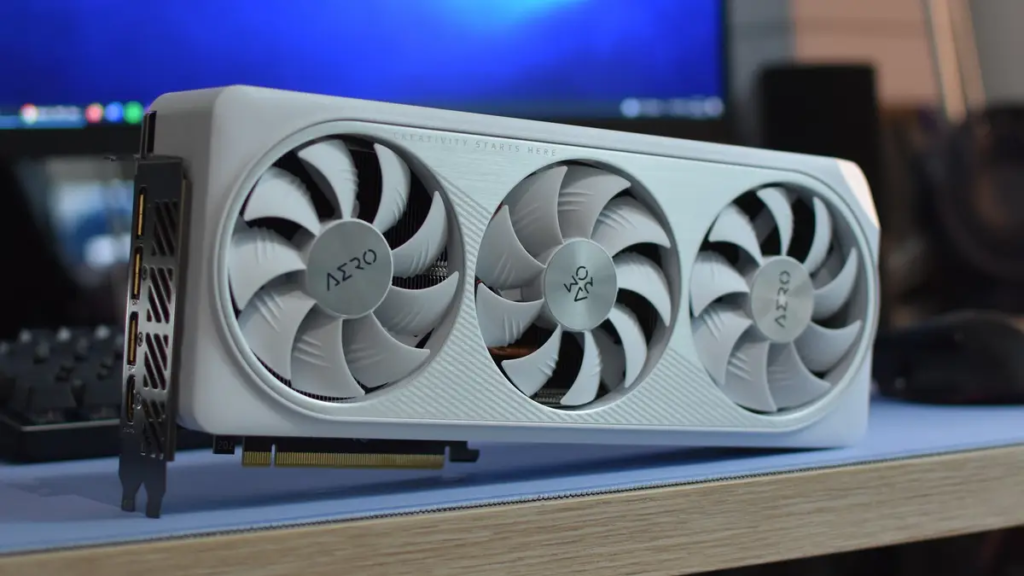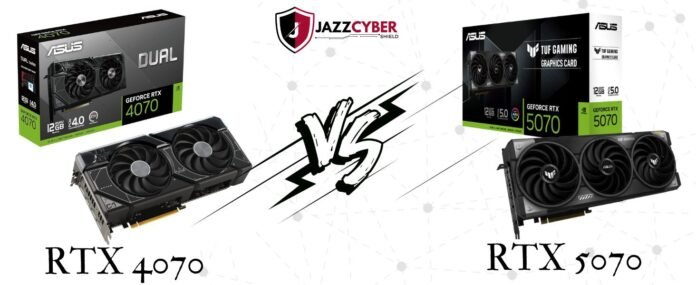The RTX 5070 launch has left gamers and content creators wondering how the new architecture performs in comparison to the last one: the RTX 4070. NVIDIA’s RTX 4000 series has always had a strong foothold in the GPU industry, while the fresh perks promised by the RTX5000 series take center stage over performance, power efficiency, and AI-driven capabilities. In this article, we will compare the RTX 4070 vs. RTX 5070 in terms of specs, performance, power consumption, prices, and features.
1. Architecture and Specifications
| Feature | RTX 4070 | RTX 5070 |
|---|---|---|
| Architecture | Ada Lovelace | Blackwell (Expected) |
| CUDA Cores | ~5,888 | ~7,168 (Estimated) |
| VRAM | 12GB GDDR6X | 12GB/16GB GDDR7 |
| Memory Bus | 192-bit | 256-bit |
| TDP (Power Draw) | 200W | 220-250W |
| Ray Tracing Cores | 3rd Gen | 4th Gen |
| DLSS Version | DLSS 3 | DLSS 4 |
The RTX 5070 is expected to showcase substantial architectural advancements with the Blackwell architecture upon which it is based and will, therefore, be a much more efficient chip with AI processing and ray-tracing ability enhancements. The upgrade to GDDR7 from GDDR6X means faster bandwidth in terms of memory and better frame rates in 4K gaming.

2. Performance Comparison: RTX 4070 vs. RTX 5070
Gaming Performance
Benchmark tests show estimates that RTX 5070 is around 20-30 percent faster than RTX 4070 in most modern AAA games. Moreover, with its greater CUDA count in addition to ray tracing performance makes for better frame rates, especially in ray-traced environments.
Expected FPS Gains in Popular Titles (4K Ultra Settings):
- Cyberpunk 2077: RTX 4070 (~65 FPS) vs. RTX 5070 (~85 FPS)
- Call of Duty: MW3: RTX 4070 (~100 FPS) vs. RTX 5070 (~125 FPS)
- Hogwarts Legacy: RTX 4070 (~55 FPS) vs. RTX 5070 (~75 FPS)
Ray Tracing & DLSS Comparison
DLSS 4 is a supercharged AI upscaling solution that raises frame rates and image quality levels even higher than DLSS 3 on RTX 4070 for maximum benefit to RTX 5070. For games developed with DLSS 4, latency is lower, next frame generation is improved, and performance is further enhanced.
3. Power Consumption and Efficiency
Power-efficient, though the Blackwell architecture has made the RTX 5070 more powerful than most. Power requirements are predicted between 220 and 250W, which is higher than that of the RTX 4070 at 200W, but the performance parity will surpass the value in efficiency.

4. Price and Value for Money
| Model | Launch Price | Current Market Price |
| RTX 4070 | $599 | $550-$650 |
| RTX 5070 | $699 (Expected) | TBD |
Expect the RTX 5070 to come with a higher price tag compared to its predecessor. Nevertheless, the performance enhancements, an increase in memory, and even an upgrade to DLSS 4 from its predecessor would definitely make it a better deal for any gamer planning for the future.
5. Conclusion: Which GPU Should You Choose?
Upgrading from an RTX 4070 to an RTX 5070 may not be very compelling for you unless you really want 4K performance or have AI gaming features in mind. If you spend a lot of time upgrading from any older RTX 3000 series GPU, however, you would find the RTX 5070 to be a serious investment and definitely beneficial for high-refresh gaming, AI-intensive workloads, and more efficient power usage.
Final Verdict:
- RTX 4070: If you’re after an impressive 1440p gaming experience for lower cash.
- RTX 5070: If those features bear future-proofing and require strong AI enhancements with some 4K.
For the latest deals on RTX 4070 and RTX 5070 GPUs, check out Jazz Cyber Shield, an authorized dealer of Seagate and other top brands in gaming hardware.




This was exactly the comparison I needed! I’ve been torn between the RTX 4070 and 5070 for my gaming rig. The breakdown of performance, power efficiency, and price was super helpful. I’m leaning towards the RTX 5070 now, based on your analysis. Also, Jazz Cyber Shield has been an awesome help in keeping my system secure while I upgrade. Thanks for the great content!